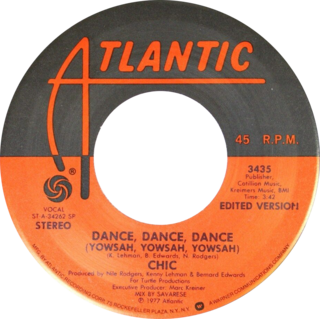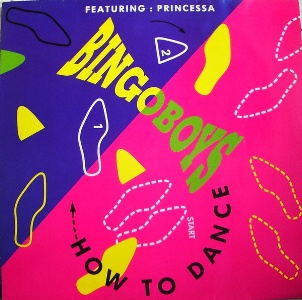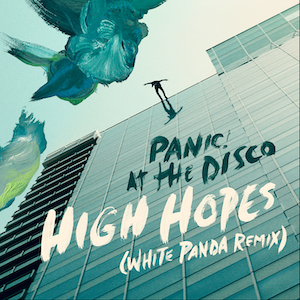
"Dancing Queen" is a Europop and disco song by the Swedish group ABBA, released as the lead single from their fourth studio album, Arrival (1976). It was written by Benny Andersson, Björn Ulvaeus and Stig Anderson. Andersson and Ulvaeus also produced the song. "Dancing Queen" was released as a single in Sweden on 15 August 1976, followed by a UK release and the rest of Europe a few days later. It was a worldwide hit. It became ABBA's only number one hit in the United States, and topped the charts in Australia, Canada, the Netherlands, Belgium, Ireland, Mexico, New Zealand, Norway, South Africa, Spain, Sweden, the United Kingdom, West Germany and Rhodesia. "Dancing Queen" also reached the top five in many other countries.
Dance Club Songs is a chart published weekly by Billboard magazine in the United States. It is a national look over of club disc jockeys to determine the most popular songs being played in nightclubs across the country. It was launched as the Disco Action Top 30 chart on August 28, 1976, and became the first chart by Billboard to document the popularity of dance music. The first number-one song on the chart for the issue dated August 28, 1976, was "You Should Be Dancing" by the Bee Gees, spending five weeks atop the chart and the group's only number-one song on the chart.

"I Feel Love" is a song by Donna Summer. Produced and co-written by Giorgio Moroder and Pete Bellotte, it was recorded for Summer's fifth studio album, I Remember Yesterday (1977). The album concept was to have each track evoke a different musical decade; for "I Feel Love", the team aimed to create a futuristic mood, employing a Moog synthesizer.

"You Should Be Dancing" is a song by the Bee Gees, from the album Children of the World, released in 1976. It hit No. 1 for one week on the American Billboard Hot 100, No. 1 for seven weeks on the US Hot Dance Club Play chart, and in September the same year, reached No. 5 on the UK Singles Chart. The song also peaked at No. 4 on the Billboard Soul chart. It was this song that first launched the Bee Gees into disco. It was also the only track from the group to top the dance chart.

"Thunder in My Heart" is a song by English-Australian singer Leo Sayer, from his fifth studio album, Thunder in My Heart (1977). The song was written by Sayer and Tom Snow, while produced by Richard Perry. It was released through Warner and Chrysalis Records in 1977, as the first single from the album. The disco song consists of a bassline and strings. "Thunder in My Heart" received generally positive reviews from music critics, who praised the production. It peaked at number 22 on the UK Singles Chart and at number 38 on the US Billboard Hot 100. A dance remix of the song by British disc jockey Meck titled "Thunder in My Heart Again" was released on 6 February 2006, and topped the UK Singles Chart.

Heartbreaker is the twentieth solo studio album by American singer-songwriter Dolly Parton. It was released on July 17, 1978, by RCA Victor. The album was produced by Gary Klein and Parton with Charles Koppelman serving as executive producer, and was an even more direct aim at the pop charts, with several of its songs verging on disco. The album topped the Billboard Top Country Albums chart for nine consecutive weeks and peaked at number 27 on the Billboard 200. The album produced two number one hits on the Billboard Hot Country Songs chart, "Heartbreaker" and "I Really Got the Feeling", while "Baby I'm Burnin'" peaked at number 25 on the Billboard Hot 100. The album has been certified Gold in the United States and Canada.

"Play That Funky Music" is a song written by Rob Parissi and recorded by the band Wild Cherry. The single was the first released by the Cleveland-based Sweet City record label in April 1976 and distributed by Epic Records. The performers on the recording included lead singer Parissi, electric guitarist Bryan Bassett, bassist Allen Wentz, and drummer Ron Beitle, with session players Chuck Berginc, Jack Brndiar (trumpets), and Joe Eckert and Rick Singer (saxes) on the horn riff that runs throughout the song's verses. The single hit No. 1 on the Billboard Hot 100 on September 18, 1976; it was also No. 1 on the Hot Soul Singles chart. The single was certified platinum by the Recording Industry Association of America for shipments of over 2 million records and eventually sold 2.5 million in the United States alone.
"If I Can't Have You" is a disco song written by the Bee Gees in 1977. The song initially appeared on the Saturday Night Fever soundtrack in a version by Yvonne Elliman, released in November 1977. The Bee Gees' own version appeared a month later as the B-side of "Stayin' Alive".

"We Are Family" is a song recorded by American vocal group Sister Sledge. Composed by Bernard Edwards and Nile Rodgers, they both offered the song to Atlantic Records; although the record label initially declined, the track was released in April 1979 as a single from the album of the same name (1979) and began to gain club and radio play, eventually becoming the group's signature song.
"Don't Leave Me This Way" is a song written by Kenneth Gamble, Leon Huff, and Cary Gilbert. It was originally released in 1975 by Harold Melvin & the Blue Notes featuring Teddy Pendergrass, an act signed to Gamble & Huff's Philadelphia International label. "Don't Leave Me This Way" was subsequently covered by American singer Thelma Houston in 1976 and British duo the Communards in 1986, with both versions achieving commercial success.

"Disco Inferno" is a song by American disco band the Trammps from their 1976 fourth studio album of the same name. With two other cuts by the group, it reached No. 1 on the US Billboard Dance Club Songs chart in early 1977, but had limited mainstream success until 1978, after being included on the soundtrack to the 1977 film Saturday Night Fever, when a re-release hit number eleven on the Billboard Hot 100 chart.

"I Love You Always Forever" is the debut single by Welsh singer Donna Lewis from her debut album, Now in a Minute (1996). Written by Lewis and produced by Lewis and Kevin Killen, it was released as the album's lead single in the United States on 7 May 1996 and in the United Kingdom on 26 August 1996. The song is inspired by H. E. Bates' novel Love for Lydia, from which the chorus is taken.

"Shame" is a 1977 single recorded by American singer Evelyn "Champagne" King, written by John H. Fitch Jr. and Reuben Cross, and released by RCA Records. It was released by RCA Records as part of King's debut album, Smooth Talk. The extended remix was produced for the twelve-inch vinyl single and would later replace the album version of the song in late-1970s reprints of the album. "Shame" was successful on Billboard music charts and would become one of King's signature songs, though it varied on international music charts. The song was covered by Zhané for the 1994 film A Low Down Dirty Shame and Kim Wilde in 1996.

"Can't Get Enough of Your Love, Babe" is a 1974 song written, recorded, and produced by American musician Barry White. Released as the first single from his third album, Can't Get Enough (1974), the song topped the US Billboard Hot 100 and Billboard R&B charts and has since become one of his signature tunes. It was his second US chart-topper, after "Love's Theme". It became a gold record in the US.

"Dance, Dance, Dance " is a song by American band Chic, released as their debut single. It was a hit in the United States, reaching number six on both the Billboard Hot 100 and Hot R&B/Hip-Hop Songs charts. In addition, along with the tracks "You Can Get By" and "Everybody Dance", the single reached number one on the Dance Club Songs chart. Luther Vandross, who was working as a session vocalist at the time, provided backup vocals on this recording.

"New York City Boy" is a song by English synth-pop duo Pet Shop Boys, released on 27 September 1999 as the second single from their seventh studio album, Nightlife (1999). In the UK, the single peaked at number 14 on the UK Singles Chart. It also reached the charts in numerous European countries, peaking at number three in Spain, and number four in Finland and Hungary. In the US, the song hit number one on the Billboard Hot Dance Club Play chart and number 53 on the Billboard Hot Singles Sales chart.

"Everybody Dance" is a song by American band Chic. The disco song, which features Norma Jean Wright on lead vocals and Luther Vandross, Diva Gray, Robin Clark and David Lasley on background vocals, was released as the second single from the band's self-titled debut album Chic (1977). According to guitarist Nile Rodgers, it was the first song specifically written for Chic, and, due to its historical status and popularity, is usually played as the opening song of the band's live set. It was later heavily sampled by British group Steps on their song "Stomp" and echoed by the Manic Street Preachers on their single "(It's Not War) Just the End of Love".

"You Make Me Feel " is a 1978 song by American disco/R&B singer Sylvester. It was written by James Wirrick and Sylvester, and released as the second single from Sylvester's fourth album, Step II (1978). The song was already a largely popular dance club hit in late 1978, as the B-side of his previous single "Dance ", before it was officially being released in December. Music critic Robert Christgau has said the song is "one of those surges of sustained, stylized energy that is disco's great gift to pop music".

"How to Dance" is a song by Austrian house music trio Bingoboys from their debut studio album, The Best of Bingoboys. The song features American female rapper Princessa. The song was first released in the United States in 1990 and was given a European release in March 1991. "How to Dance" peaked at number two in Austria and reached the top 10 in Australia, Denmark, Finland, and the Netherlands. In the US, it climbed to number 25 on the Billboard Hot 100 and topped the Billboard Hot Dance Club Play chart for one week in March 1991.

"High Hopes" is a song by American pop rock band Panic! at the Disco. The song was released through Fueled by Ramen and DCD2 Records on May 23, 2018, as the second single from the band's sixth studio album, Pray for the Wicked (2018). The song was written and produced by Jake Sinclair and Jonas Jeberg, and co-written by Brendon Urie, Jenny Owen Youngs, Lauren Pritchard, Sam Hollander, William Lobban-Bean, Taylor Parks, and Ilsey Juber, with additional production by Jonny Coffer. It was serviced to alternative radio on July 31, 2018, and impacted hot adult contemporary radio on August 27, 2018, and US pop radio the following day. The music video was also released on August 27, 2018.




















